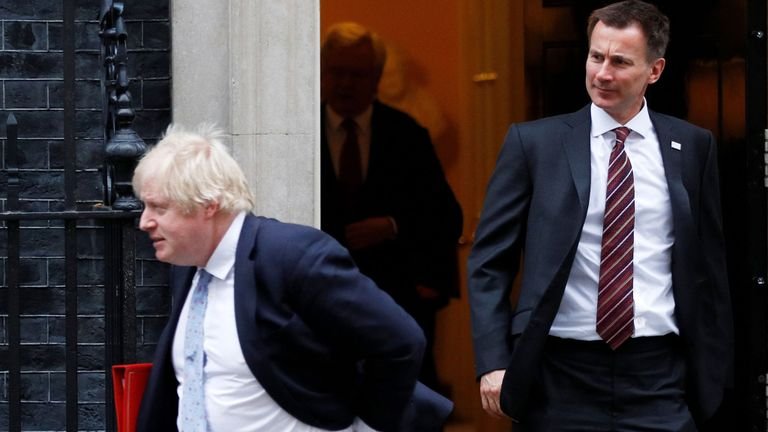The Future of British Democracy: Johnson or Hunt?

Brexit is a process that has dominated discussions, debates and deliberations related to global politics in recent times and there is little doubt that it will be remembered as a significant landmark in international history, irrespective of what the pending outcome looks like. There have been several milestones since the decision of the country to leave the European Union in 2016 and the latest in that series happens to be the selection of the successor to Prime Minister Theresa May.
Prime Minister May announced that she would be stepping down as leader of the ruling Conservative Party after being in charge for 1,059 days in May 2019. She has continued as the Prime Minister and will remain in office until a successor is chosen by the Conservative Party, a process that should be completed in six weeks from her announcement. By the end of July, we are expected to see a new face leading Britain and its parliament towards a final solution regarding Brexit that has evaded the country till now. While there were many options, that were possibilities following May’s announcement, the race has finally come down to two individuals: Boris Johnson and Jeremy Hunt.
Although May had been dubbed the ‘New Iron Lady’ is the only female British Prime Minister after Margaret Thatcher, May’s premiership waned in power over the course of her tenure, following costly miscalculations and challenging circumstances. Taking over from David Cameron in 2016, the primary expectation from May was the successful delivery of Brexit, who inherited a policy that she did not support. Despite her attempts to secure a negotiated deal on Britain’s withdrawal from the European Union and gather enough parliamentary support for it, the lack of support for May and her deal within the Tories was fatal for her tenure. Her attempt to increase parliamentary majority by calling for a general election in 2017 which resulted in a loss for her was a severe blunder that cost her dearly, especially with the support from her own party fading away despite the reintroduction of the Brexit deal thrice in the parliament. Along with the 36 cabinet resignations, Tory infighting and challenges to her leadership, the criticism surrounding the Brexit deal spelt an inevitable end for May’s time at 10 Downing Street and the announcement was merely a confirmation for what was anticipated by many. Anand Menon, the Director of UK in a Changing Europe, a London-based research institute, stated that “She’ll be [remembered as] the prime minister that failed to deliver Brexit, and that was the only thing she tried to do.”
May’s successor, whether it is Johnson or Hunt, will without a doubt face the same challenge that May did: a parliamentary deadlock combined with an impending deadline to act. While speaking about her succession, she mentioned that “he or she will have to find consensus in the Parliament where I have not.” Heeding the advice emerging from May’s reflection will become incredibly important for the new leader, with the United Kingdom’s departure date from the European Union having been delayed to 31 October 2019.
Boris Johnson, the former Foreign Secretary who resigned earlier in protest of May’s Brexit deal, is currently the favourite to win the race by a significant margin. As one of the most prominent members of the ‘Leave’ campaign, the 55-year-old secured 162 votes in the fifth round of voting, the highest of any candidate in the process of succeeding May. While Jeremy Hunt still stands in his way between securing the portfolio of the British Prime Minister, the 52-year-old Foreign Secretary who succeeded Johnson only received 77 votes in the fifth round of voting. The threat from the rising Brexit Party’s success in the European parliamentary elections has been taken seriously by the Tories and Hunt’s argument that a no-deal Brexit would be “political suicide” has not helped his cause in securing enough support within the party to significantly challenge Johnson’s hardline approach to Brexit, especially for those who remember him as a former Remainer.
Despite the European Union refusing to renegotiate the deal, both Johnson and Hunt have claimed that they will manage to get the European Union back to the negotiating table. Johnson has claimed that Britain will leave the European Union on 31 October whether or not a deal has been reached if he is the Prime Minister, which the parliament does not want because of the catastrophic consequences for Britain. While Hunt has tried to project himself as the more responsible, business-minded alternative to Johnson, it is important to keep in mind that while Johnson may be polarizing figure among the public, he does have a lot of support from the Tories because of his desire to deliver Brexit at any cost.
Tory support is the decisive element in this race because the Conservative Party chooses the successor to May within the party, and as a result, the Prime Minister. This includes Conservative Party Members of Parliament and ordinary party members, who are the only ones with a voice in the race. 160,000 party members, which is 0.3% of the voting population of Britain, choosing the next Prime Minister, especially during such a historical political phase can hardly be called the most democratic system. Critics claim that the contest has wasted valuable time before the Brexit decision, led to the rigging of the contest by the Johnson camp by selecting the opponent it wanted, pushed candidates to make unrealistic pledges and turned defeated contenders into hypocrites in order to secure positions in Johnson’s cabinet. Patrick Dunleavy, professor of political science and public policy at the London School of Economics, stated that he would give the contest “around two and a half points out of 10” as an exercise in democracy.

The tiny minority that decides the next prime minister would represent only a section of the British population that deserves a voice in the upcoming political decision. The majority of the party consists of individuals belonging to the top social class who are over 55 years of age. Professor Dunleavy further said that “the Conservative membership is atypical of the country in demographic terms; it is more elderly, more nostalgic for empire and probably has a lot of delusions as to Britain’s place in the world.”
While neither candidate has outlined a reliable plan of action for Brexit, their pitches have catered to their electorate with unrealistic promises and an unwavering commitment to ensuring Brexit happens as early as possible. Britain’s unwritten constitution has led to a scenario where the future of the country is being decided through a system that eliminates the voices of 99.7% of the voting population. It is concerning for democracy that the future of the country will be decided by a tiny partisan group. The working majority of the Tories in parliament and the disappointing result following May’s decision to call for a general election to consolidate support means that there is a good possibility that the new prime minister will remain in the position till the next general elections of 2022.
It looks increasingly likely with every passing day that Boris Johnson may finally reach 10 Downing Street after a long period of waiting. Considering that the voting will be limited to the small group of people who identify with his cause and there is an urgency to get down to business, the victory that seemed imminent from the start may be coming to fruition. The principles of democracy can take a backseat while the Tories decide how to move forward with their interest in the name of the British people. Having said that, it does not mean that if Johnson were to succeed in May that the pursuit of Brexit would suddenly become a cruise. It would remain a challenge but the inevitability of Britain leaving the European Union with or without a deal is something that the British public clearly no longer have a say in.


















